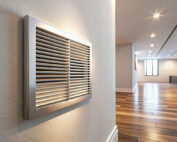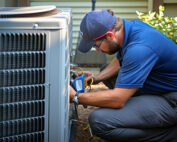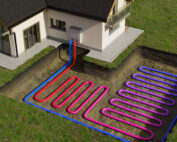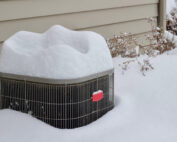Your HVAC system is a vital component of home comfort, providing heating, ventilation, and air conditioning year-round. But what damages an HVAC system? Common causes include poor maintenance, debris buildup, power surges, and fluctuating temperatures. Understanding these factors can help you avoid costly repairs and extend your system’s life.
1. Neglecting Regular Maintenance
Skipping maintenance is one of the leading causes of HVAC damage. HVAC systems rely on clean filters, lubricated parts, and routine inspections. Dust, grime, and other contaminants can build up over time, making the system work harder than it should. This stress leads to premature wear and tear on parts, which increases the chance of breakdowns.
Regular maintenance catches problems early, saving you from costly repairs. Schedule biannual check-ups, ideally before peak winter and summer seasons. These visits are crucial to keep everything running smoothly.
2. Dirty Filters
Filters are essential for keeping the air clean. Over time, they collect dust, dirt, and allergens, which restrict airflow. Restricted airflow causes your system to work harder and can lead to overheating. Changing or cleaning filters regularly can prevent this damage.
In most households, filters should be replaced every three months. However, if you have pets or allergies, replacing them monthly is better. Doing so will keep your system running efficiently and improve indoor air quality.
3. Thermostat Issues
A malfunctioning thermostat can cause a host of problems. It may misread temperatures, leading the HVAC system to work harder than necessary. Short cycling, where the system turns on and off frequently, is a common result of thermostat issues. This cycling wears down components quickly and leads to higher energy bills.
A programmable thermostat can help, allowing you to set temperatures based on when you’re home. This saves energy and reduces stress on your HVAC system.
4. Power Surges
Unexpected power surges can significantly damage your HVAC system. Surges usually happen during storms, but electrical faults within the home can also cause them. When a power surge occurs, sensitive HVAC components, like the compressor, may burn out.
Installing a surge protector can guard your HVAC system against these issues. Some HVAC systems come with built-in protection, but if yours doesn’t, it’s worth considering.
5. Overworking the System
Running your HVAC system constantly or setting extreme temperatures can lead to overheating. Many people assume turning the thermostat as high or low as possible speeds up heating or cooling. In reality, it only strains the system, causing it to wear out faster.
Keep the thermostat set to moderate temperatures to avoid overworking your HVAC. Consider using fans to help distribute air more evenly, making the system’s job easier.
6. Obstructed Outdoor Unit
Outdoor units need space for proper airflow. Plants, debris, and objects placed too close can obstruct it, reducing efficiency. An obstructed unit has to work harder, and over time, this can cause damage to internal parts.
Make it a habit to check the outdoor unit regularly. Trim plants and remove debris to maintain clear airflow. Keeping the unit clean and free from obstacles will improve efficiency and prevent damage.
7. Professional Installation is Key
Improper installation is another factor that can damage an HVAC system. Incorrect sizing or faulty setup leads to issues like uneven cooling, inefficient operation, and premature breakdowns. Always hire a licensed technician for HVAC installation. They will ensure the system is installed correctly and provide guidance on proper operation.
8. Age and Wear
Like any appliance, HVAC systems have a limited lifespan. The average system lasts 10-15 years. As it ages, parts begin to wear down and require more repairs. An older HVAC system may struggle to keep up, resulting in frequent breakdowns.
Replacing an outdated system is often more cost-effective than constant repairs. Newer models are also more energy-efficient, which can save you money in the long run.
9. Ignoring Warning Signs
Small issues can quickly escalate if left unaddressed. Unusual noises, inconsistent temperatures, or rising energy bills are warning signs. Ignoring them only puts more stress on the system, leading to further damage.
If you notice any of these signs, contact a technician promptly. Early detection prevents minor issues from turning into expensive repairs.
10. Inconsistent Usage and Temperature Fluctuations
Frequent switching between heating and cooling modes can stress your system, especially during times of fluctuating temperatures. In Maryland, recent swings from the 30s to the upper 70s have put extra strain on many HVAC systems. Rapid temperature changes make the system work harder, leading to faster wear on components.
To minimize this damage, try to limit frequent mode switching. During these seasonal swings, consider using fans or opening windows instead of constantly adjusting the HVAC settings.
By paying attention to these factors, you can help prevent damage to your HVAC system. Regular maintenance, mindful thermostat use, and a proactive approach to issues are essential. Taking these steps will extend your system’s life and ensure it operates at peak efficiency. Will Air offers comprehensive residential HVAC service, including sales, installation, and duct cleaning, to help keep your system in top shape year-round.
Hot Topics
Recent Posts
What Is Duct Cleaning and Why Do You Need It?
When was the last time you had your air ducts cleaned? If you can’t remember—or [...]
Top Maintenance Tips to Save Energy This Winter
As temperatures drop, homeowners and businesses rely heavily on their heating systems to stay comfortable. [...]
How Do Geothermal HVAC Systems Work?
Geothermal HVAC systems are gaining popularity as a sustainable alternative to traditional heating and cooling [...]
Maintain HVAC Efficiency During Extreme Weather
Extreme weather can challenge your HVAC system, pushing it to work harder than usual. Knowing [...]







